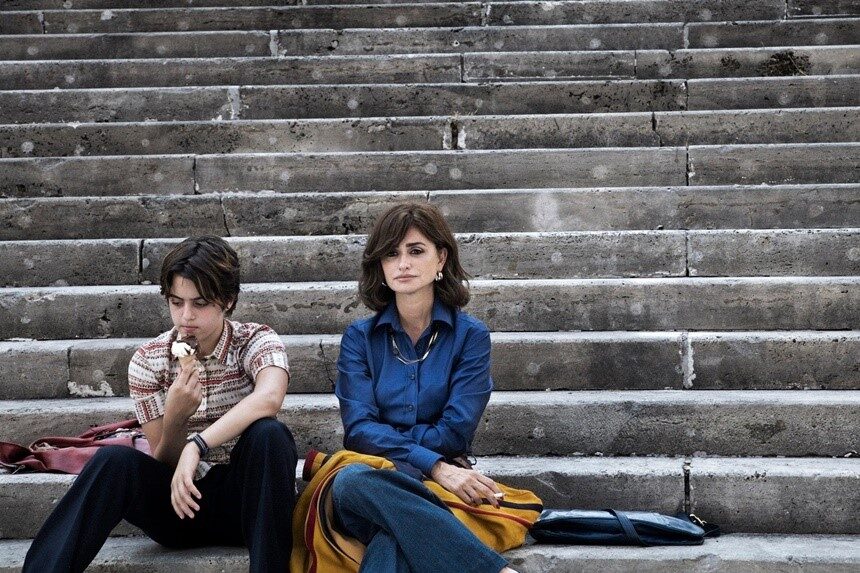L’immensità
⭐️ ⭐️ ⭐️
Run Time: 1 hour 37 minutes
Stars: Penélope Cruz, Vincenzo Amato, Luana Giuliani
Writers: Emanuele Crialese, Francesca Manieri, Vittorio Moroni
Director: Emanuele Crialese
The film’s title is Italian for “The Immensity,” and to be sure, director Emanuele Crialese’s story of a disintegrating 1970s Rome family is fraught with enormous personal issues, most of which remain frustratingly unresolved at the fadeout.
Clara (Penélope Cruz) is stuck in a marriage with Felice (Vincenzo Amato), a man who is alternately distant and abusive. She adores her three children and the feeling is mutual, as established in the film’s glorious opening in which the four, setting the dinner table, turn a mundane task into a full-blown musical extravaganza.
But between Clara and the kids flow currents of despair. Despite her penchant for bursting into song and telling silly jokes, she knows the children are suffering steady trauma as Felice insults, assaults, and abuses her. Aside from barking at them to eat their dinner, he mostly ignores them—except for the oldest, a tween daughter named Adriana (Luana Giuliani, dark-eyed and mesmerizingly inscrutable).
It galls Felice beyond belief that Adriana has decided she is a boy named Andrea (changed to “Andrew” for the English subtitles). Andrea dresses in loose shirts, wears close-cropped hair—and has even struck up a fledgling relationship with a girl who has no idea of Andrea’s complicated truth.
“You and dad made me wrong,” Andrea, licking a gelato cone, tells Clara as they sit on a long Roman stairway. “And you don’t have the powers to fix me.”
There are myriad dynamics at work in L’immensità — between Clara and Felice, between the parents and their children, and among the kids themselves — but co-writer/director Emanuele Crialese is especially interested in the tender but complex interplay between Clara and Andrea.
Clara, especially in the hands of Cruz, is a vivacious, brilliant woman slowly being strangled by the 1950s-style conventions of ’70s Italy. Watching raven-haired Cruz float through the city’s narrow streets, fending off the catcalls of troglodyte Italian men, it’s hard not to conjure up memories of Sophia Loren, the actress who defined the emerging feminism of post-war Europe.
“Could we separate?” Clara meekly asks Felice following a particularly brutal encounter.
“Don’t be ridiculous,” he sneers. “Where would you go?”
And she has no answer for that.
In Andrea, Clara sees a similarly independent-minded person pounding on the door of a more tolerant future. Today, a smart, strong-willed trans kid like this would have the makings of a TikTok star. In 1970s Italy, dominated by braying he-men, a public admission of self could have been life-threatening.
Likewise, Andrea finds in Clara a refuge from a world that, from this chronological perspective, we will probably never understand. Clara’s love for her children is, in the end, unshakable, and Cruz sensitively evokes both Clara’s undying affection and grave worry about what kind of life Andrea might choose.
Lovingly photographed by Hungarian cinematographer Gergely Pohárnok, every scene in L’immensità is filled with details that define a privileged life on the skids: The masterworks on the walls, the children’s elaborate bedroom, the sweeping view of St. Peter’s Basilica all scream of wealth while whispering of the excessively ordered existence unfolding within these walls.
Eventually, the family’s story yields a sobering revelation: The world does not bend to our wishes, nor does time hasten its stately pace for our benefit. The future is something we’ll just have to wait for.
It is Adriana/Andrea who finally has to explain this to Clara: When mom tries to join a children’s game at a boring family get-together, it is her eldest child who sends her away, as if to say, “Don’t try to escape your reality by going backwards. Just keep moving forward.”
Become a Saturday Evening Post member and enjoy unlimited access. Subscribe now



